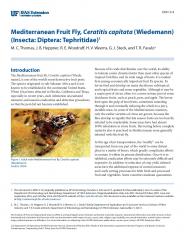Sour Sop or Annona muricata is a tropical short bushy tree that can grow up to 7 m tall with a diameter of up to 15cm. It has a thick, slightly shiny, long and narrow leaves. The flowers are large, often on its own or in groups of three. There have been researches that prove the medicinal properties of Sour Sop. It can be used to prevent or cure malaria and amoeba, as uterotonic, cardiac depressant, antifungal and antibacterial, and as treatment for parasitic diseases. It also acts as insecticide. The leaves when crushed are used as relief from distension and dyspepsia, scabies and skin diseases, rheumatism, and coughs and colds. It can also be applied directly to maturate boils and abscesses. Further, the leaves have sleep-inducing properties and can be placed under the pillow. The fruits, on the other hand, are used to treat bedwetting in children. It is also used as treatment for scurvy, fever, and as a vermifuge. The bark is used to stop bleeding on wounds. Other plant parts are used to treat headache, hypertension, heart problems, anxiety attacks, chest pains, nerve disorders, diarrhoea, and convulsions. The ovoid, spiny fruit is juicy and as fragrant as pineapple. When fully ripe, it is consumed raw or mixed with ice cream or milk. Immature fruits are used as vegetable. The leaves are source of corossol tea. The seeds are toxic and the stem contains an irritant sap. Like other plants in the Annonaceae family, it cannot tolerate frost but it can tolerate quite poor soil and a humid climate. It is fast growing and fruiting starts when the tree reaches its second year.
Annona muricata is an evergreen Tree growing to 7 m by 7 m at a fast rate.
It is hardy to zone 10 and is frost tender. The flowers are pollinated by Flies, Beetles, Insects.
Suitable for: light , medium and heavy soils, prefers well-drained soil and can grow in nutritionally poor soil. Suitable pH: acid, neutral and basic soils and can grow in very acid and very alkaline soils.
It can grow in semi-shade or no shade. It prefers moist soil and can tolerate drought.
Grows best in the moist, humid tropical and subtropical lowlands at elevations up to about 1,000 metres. It prefers a mean annual temperature in the range 25 - 30c with a mean annual rainfall over 1,000mm. Grows best in a sunny position. Prefers a moist but well-drained, sandy loam with a pH in the range 5.5 - 6.5. Prefers a deep rich loam. Succeeds in light-textured, alkaline soils. Established plants are very drought tolerant. The leaves have an aroma similar to blackcurrants. Flowers are protandrous, and the pollen is shed as the outer petals open towards the evening. The inner petals open much later and only very slightly, admitting small insects attracted by the fragrance of the flowers. Presumably these insects effect cross-pollination, though rather inadequately, for few flowers set fruit and many fruits are misshapen since numerous ovules are not fertilized. Hand pollination is effective in improving fruit yield and quality. Sporadic flowering and fruiting can occur all year round in favourable conditions. Fruiting starts in the 2nd year, and 5-year-old trees produce 10 - 50 fruits, depending on pollination efficiency and nutrient status. It bears fruit almost continually throughout the year, but there is normally one season when more fruit are getting ripe. Fruit can weigh up to 4-5 kg each. A tree can produce 12-24 fruit in a year. The fruit contain 11-14% sugars. There are many named varieties. The area around the base of the tree should be kept free from weeds or covered with mulch to avoid dehydration of the shallow roots during the dry season. Annona muricata can tolerate dry soil conditions, but the trees shed too many leaves if they experience prolonged drought. Problems include: seed borers, scale, mealy bugs.
HabitatsFound on coastal limestone and lowland woodland.Resources
IN37100

EENY-214
Mediterranean Fruit Fly, Ceratitis capitata (Wiedemann)
(Insecta: Diptera: Tephritidae) 1https://edis.ifas.ufl.edu/pdffiles/IN/IN37100.pdfIN37100IN37100
EENY-214
EDIS - Electronic Data Information Source - UF/IFAS Extension
Mediterranean Fruit Fly, Ceratitis capitata (Wiedemann)
(Insecta: Diptera: Tephritidae) 1
